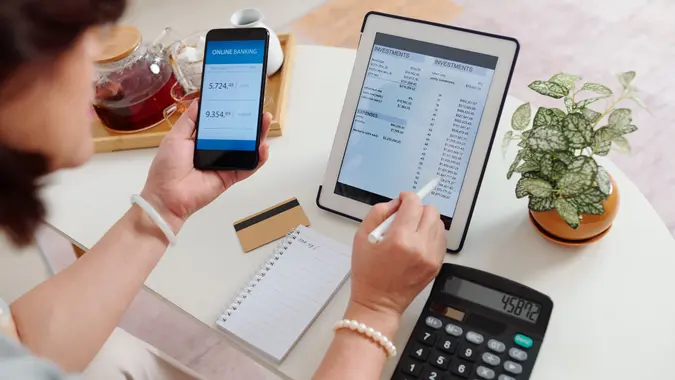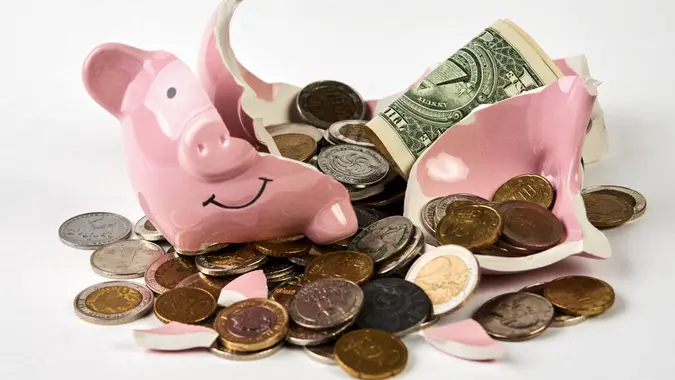I’m a Bank Teller: 7 Ways Banks Can Help You Achieve Financial Independence

Commitment to Our Readers
GOBankingRates' editorial team is committed to bringing you unbiased reviews and information. We use data-driven methodologies to evaluate financial products and services - our reviews and ratings are not influenced by advertisers. You can read more about our editorial guidelines and our products and services review methodology.

20 Years
Helping You Live Richer

Reviewed
by Experts

Trusted by
Millions of Readers
Rachael P. has been a bank teller for a very long time and she’s seen it all. From customers who don’t know the first thing about their money to those who are working the bank for all its worth, she’s seen the best and the worst at work.
Because of this, she’s learned a thing or two about how banks can help people with their money. “I know a lot about this because I work at the bank,” she said. “But, to be honest, I learn most things from my customers.”
Here are seven ways banks can help you achieve financial independence, according to a bank teller.
High-Yield Savings Accounts: Your Money’s New Best Friend
“If your savings are sitting in a regular account, you’re leaving money on the table,” Rachael shared. “High-yield savings accounts are where it’s at – the interest rates can get really high.”
If you want to find the right one, Rachael says to shop around – even if it means switching banks. “I’ve had customers leave because we don’t have the best rates and yeah, I can’t blame them,” she said.
Budgeting Tools: Your Financial GPS
“Most banks have budgeting tools in their apps,” Rachael shared. “These can categorize your spending, set limits and even predict future expenses. They’re actually pretty advanced!”
She’s seen customers turn their finances around just by using these free features. If you’re unsure how to access them, ask someone at your bank to sit down and explain them to you.
Automated Savings: Building Wealth While You Sleep
Setting up automatic transfers from checking to savings is a no-brainer when you want to grow your money. “It’s the ‘set-it-and-forget-it’ approach to saving,” Rachael shared. “It really does add up when you’re not paying attention.”
Start small if you’re new to this. “Even $20 a week is better than nothing,” she said. “Once you see that savings account growing, you’ll be motivated to save even more.”
CD Ladders: For the Savings Overachievers
If you’re looking to earn higher interest without tying up all your money, Rachael suggests CD ladders. “It’s a strategy where you spread your money across CDs with different maturity dates,” she explained. “This way, you’re always getting some money back while still earning higher interest rates.”
She warns it’s not for everyone. “It takes some planning, but again, ask for help,” Rachael said.
Personal Loans: Debt Consolidation Done Right
It’s counterintuitive but, in some cases, Rachael says that taking out a loan can actually help you achieve financial independence. “Especially if you have high-interest debt,” Rachael shared.
But be careful – you don’t want to rack up new debt once you’ve consolidated. “The key here is to get rid of debt completely, so be careful.”
Investment Services: Not Just for the Rich and Famous
Many banks now offer investment services that don’t require a fortune to start. “You don’t need to be a millionaire to start investing,” Rachael said. “Many banks offer low-cost index funds or robo-advisors that can help you start building wealth with just a few hundred dollars.”
Often, banks will offer free consultations with financial advisors. “Just make sure there aren’t any fees attached,” she shared.
Free Financial Education: Knowledge Is Power (and Money)
Rachel shares that many banks offer free financial education resources. “Workshops, webinars, online courses – banks are practically begging you to get smarter about money,” she said.
She’s seen these freebies change lives. “I had a customer who went to one retirement workshop and finally started her 401(k) after putting it off for years,” Rachael said. “It’s never too late to learn how to adult with your money.”
 Written by
Written by  Edited by
Edited by 
























